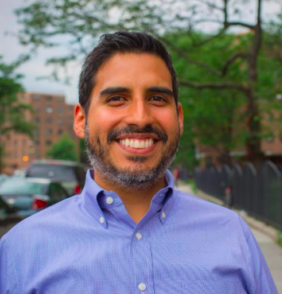Program Manager of Worker Cooperatives, Urban Upbound
How did you get into this work?
Back in 2014, Urban Upbound began the process of developing a worker cooperative in Astoria Houses, a NYCHA development in Western Queens. I was asked to lead the project in late 2015. I had been working with another program that also served the Astoria Houses community and I had developed strong ties to it. That, in addition to my background in marketing and operations proved key as the program grew. We have launched two worker cooperatives (OnPoint Security and OSHA Solutions) and a third, Paw Partners is almost there. We are very happy and excited for them!
What does ‘solidarity economy’ mean to you?
I see it as a market system in which actors’ decisions are not based solely on what is ‘best’ for themselves, usually with making/saving money as the main criteria, but are rather based on whether they create the most possible value in society. It’s a system built not around the lone individual but instead the inextricable relationship between a group and their environment.
What are the biggest challenges you face in this work?
More funding would of course help, but the real challenge is within our own minds. As an undergrad majoring in Economics, I remember the premise behind our studies was that resources were limited, scarce. You begin making ‘rational’ decisions thinking the best you can do is manage those resources to do the most good (or the least bad) but it will never be enough. This type of thinking builds a cage in your mind and can inhibit creativity. If you’ve only got lemons, is making lemonade the best you can do? A key in entrepreneurship is spotting opportunities and recognizing potential. At our workshops we aim to unlock that door for ourselves and the co-op members, whether we are discussing markets, training or business partners.
Why do you think it’s important for cooperatives to help other cooperatives?
To me, cooperatives cooperating among each other is as important as cooperatives taking in new members. It’s necessary if they want to keep alive the spirit that first led them to make the co-op. If a group of workers comes together to form a business because it’s a good financial decision and their success is measured by profitability alone, in my book that’s a partnership and not a cooperative. The same way there must be a mechanism for new workers to gain ownership, there needs to be an explicit agreement of membership in the broader movement, based in an understanding that cooperatives need each other. This is how we truly build community assets and create impact.
What is your ‘theory of change?’
Urban Upbound’s theory of change states that in order to effectively break cycles of poverty a multifaceted approach is needed, thus our five core programs: employment services, financial counseling, income support services, community revitalization and lastly, financial inclusion through the UU Credit Union.
Where can we find more information about the work you are doing in the future?
Visit Urban Upbound’s website and follow us on social media. Also, we’re part of the city funded Worker Cooperative Business Development Initiative (WCBDI). Every year it publishes a report on the great work all the partners do.
What is the best way for people to get involved and support your work?
Drop us a line at carlos@urbanupbound.org and keep the co-ops in mind, whether you become a new client or refer them to others. Visit OnPoint Security and OSHA Solutions (and soon Paw Partners).


